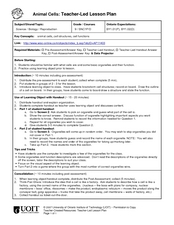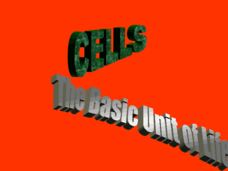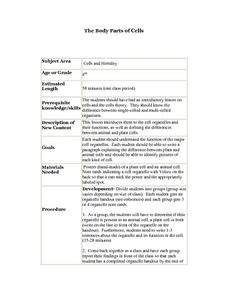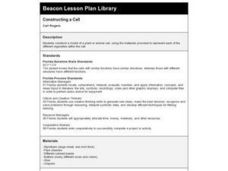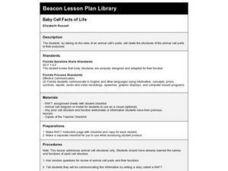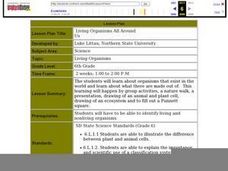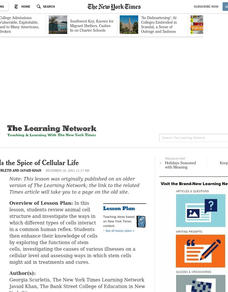Curated OER
Animal Cells
Students define the function of the different parts of a cell. In this biology lesson, students discuss cell structures and how its organelles perform basic functions. They differentiate between human and animal cells.
Odell Education
Plant and Animal Cells
Incorporate multiple facets of the cell into your next high school lab! Through an introduction to cell organelles, class members observe each cell type and draw visuals to further demonstrate understanding of cellular processes in both...
Curated OER
Cells: A First-Hand View
In the first of two activities, your charges prepare wet mount slides of cork and bean sprout cells in imitation of Robert Hooke's historical investigation. An excerpt from his notes is included. Then, investigators compare animal cells...
Baylor College
Magnifying and Observing Cells
Though it isn't a novel activity to prepare onion cell and Elodea plant cell slides as examples of cells in a microbiology unit, this resource will leave you thoroughly prepared. As pupils examine the slides that they prepare, they draw...
Curated OER
Plant and Animal Cells
Students investigate parts of a cell. In this plant cell lesson, students determine the difference between plant and animal cells. Students discover that coral is an animal based on cell characteristics. Students create puppets to...
Curated OER
Plant and Animal Cells: Alike and Different?
Seventh graders create a mneumonic device and a graphic organizer about the parts of plant and animal cells. In this biology lesson plan students are introduced to the parts of the cells and then work in groups to create projects that...
Cornell University
Plant Cell Crime Scene
Use science to solve the mystery of the Poplar murder. Pupils use forensic botany to determine if a suspect could be the killer. By analyzing images from a Transmission Electron Microscope, learners determine if the material found on the...
Curated OER
Cells - The Basic Unit of Life
Introduce students to cells, and their many parts in this biology presentation. Students see that plant and animal cells have many of the same type of structures, but also have many differences as well. They will be challenged to state...
Curated OER
The Cell as a System
Young scholars review cell structures and investigate how the components of a cell operate as a system. They compare a plant and animal cell and then make a model of a cell. Students begin to understand the cell as a system by...
Curated OER
The Body Part of Cells
Eighth graders are introduced to cell organelles and their functions and the they define the differences between animal and plant cells. They write a paragraph explaining the difference between plant and animal cells and students...
Virginia Department of Education
Cell Parts
What do a bird, an egg, a rabbit, and a toad all have in common? This fun-filled resource explains the similarities and differences between cells and how all cells are similar, yet all are different. Learners begin by depicting a...
Curated OER
Bread Cells
Fifth graders examine plant and animal cells. For this plant and animal cell lesson, 5th graders define what cells are, label their parts, and describe how plant and animal cells are different. They observe cells at a number of web...
Curated OER
Cell-O
Young scholars create model cells using gelatin, toothpicks, and various fruits to represent organelles. Then, students observe their models and complete a Venn Diagram comparing and contrasting plant and animal cells.
Curated OER
Constructing a Cell
Third graders, in groups, make a model of a plant or animal cells and represent each of the organelles in the cell.
Curated OER
Regents High School Examination: Living Environment 2003
The living environment, from the interior of a cell to the complex relationships among populations, are queried in this final examination. Learners look at air pollution maps, diagrams of cells, population graphs, and drawing of cells....
Curated OER
Regents High School Exam: Living Environment 2008
Tne New York Regents High School Examinations are comprehensive and include various styles of questions, includingmultiple choice and the analysis of graphs. This particular version, the 2008 Living Environment exam surveys a variety of...
Curated OER
MAKING THREE DIMENSIONAL PLANT AND ANIMAL CELLS
Young scholars create two different cells, one plant and one animal. In this plant and animal cell instructional activity students form groups and construct a part of a cell. Young scholars then put them all together to form one...
Curated OER
Baby Cell Facts of Life
Students examine the roles of an animal cell's parts, how each part relates to one another and then demonstrate their knowledge by writing a story about the animal cell structure.
Curated OER
Living Organisms All Around Us
Sixth graders study organisms that exist in the world and what they are made up of. They participate in a nature walk, a presentation, a drawing of an animal and plant cell, draw a ecosystem, and fill out a Punnett square.
Curated OER
Variety Is the Spice of Cellular Life
Do you need to review animal cell structure? Investigate the ways in which different types of cells interact in a common human reflex. Your learners can explore the functions of stem cells, consider various illnesses and assess stem...
Curated OER
Cells, Cells, Cells
Students explore plant and animal cells. Using household items, students create a three-dimensional model of a plant or animal cell. Students identify and label each cell part.
Curated OER
Cell Structure
Students study plant and animal cell components. In this cell lesson plan students identify parts of a cell, view a PowerPoint presentation and diagram a cell.
Curated OER
Cell Analogies!
Liken a cell and its organelles to a tiny person and its organs. After gathering information on cell structures and their functions, small groups collaborate to come up with an analogy of their own. They produce a collage describing the...
Curated OER
Animal Characteristics
Allow your students to review what they learned about animal characteristics with this PowerPoint. This slideshow includes 9 multiple choice questions and an answer key at the end. Tip: You can use this as an assessment by having your...
